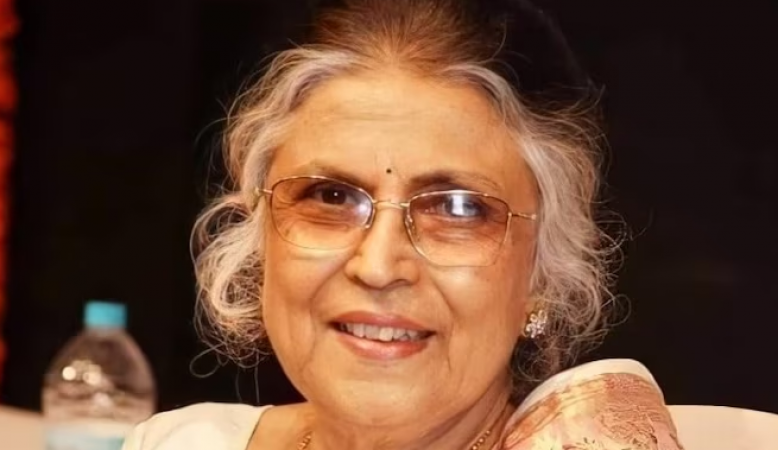
As one of the most melodious and versatile voices of her time, Suman Kalyanpur holds a special place in the rich tapestry of Indian playback singing. Her remarkable rise from impoverished beginnings to becoming a renowned playback singer is a testament to her exceptional talent. Suman Hemmadi was born on January 28, 1937, in a small village in present-day Karnataka. Suman Kalyanpur, whose entrancing voice and classic melodies frequently led to comparisons to the legendary Lata Mangeshkar, carved out a special place for herself.
Young Suman Kalyanpur was introduced to music. She was raised in a musically inclined family, which was crucial in determining her future. Her maternal uncle was the illustrious playback singer Master Dinanath, and her father, Pandit Dinanath Mangeshkar, was a well-known classical singer. Suman developed a strong love for music as a result of his family's connection to the genre.
Suman demonstrated a prodigious talent for singing at a young age. Her family supported her in pursuing formal training in classical music because they saw potential in her. She was taught the fundamentals of Hindustani classical music by a local guru. She quickly became well-known in her hometown thanks to her exceptional voice and commitment to developing her craft.
Suman Kalyanpur first encountered fame when she relocated to Mumbai (then Bombay) in order to pursue her aspirations. Her first opportunity in the Hindi film industry came about as a result of the producers and music directors being drawn to her captivating voice. With the release of "Marathi Chimukla" in 1954, she made her playback singing debut. Soon after, she started composing music for Hindi movies.
Suman Kalyanpur's uncanny vocal resemblance to the legendary Lata Mangeshkar was one of the most notable aspects of her career. She was frequently mistaken for the playback queen herself because of how strikingly similar her voice was to Lataji's. She started to gain recognition as a playback singer who could easily fill in for Lataji when necessary as a result of this resemblance, which opened doors for her in the industry.
The 1960s and 1970s were the pinnacle of Suman Kalyanpur's career, when she rose to prominence as one of the most in-demand playback singers in the Indian film industry. Music directors and audiences loved her for her sweet voice, perfect diction, and emotional interpretation of songs. A few of her well-known songs from this time period are "Tumhari Nazar Kyon Khafa Ho Gayi" from the movie "Do Kaliyan," "Tumne Pukara Aur Hum Chale Aaye" from "Rajkumar," and "Na Tum Bewafa Ho Na Hum Bewafa Hai" from "Ek Kali Muskai."
Suman Kalyanpur's versatility knew no bounds, despite the fact that she primarily provided her voice for Hindi films. She produced songs in Marathi, Assamese, Gujarati, Kannada, Maithili, Bhojpuri, Rajasthani, Bengali, Odia, and Punjabi, among other languages. Her versatility as a playback singer was demonstrated by her effortless ability to sing in different languages, which solidified her reputation as a pan-Indian musical talent.
She worked with the renowned music producer S.D. Burman on a number of notable projects after he noticed her special talent. They collaborated to produce enduring melodies that still appeal to music lovers today. The haunting beauty of Suman's songs from movies like "Abhimaan" and "Tere Mere Sapne" continues to be praised.
Due to her uncanny resemblance to Lata Mangeshkar, Suman Kalyanpur's career underwent an intriguing development. Despite the fact that she frequently had people mistaken her for Lataji, she was still regarded as a stand-alone playback singer with her own style. Some music producers purposefully chose her to provide the voice for songs that featured actresses that Lataji did not care for. This demonstrated her versatility and strengthened her reputation as a reliable playback singer in the business.
Suman Kalyanpur had a long and successful career, and she made immeasurable contributions to the music industry. She became a well-liked figure in the playback singing community thanks to her effortless ability to switch between languages and genres. Suman Kalyanpur may have first come to prominence due to her Lataji resemblance, but she quickly distinguished herself with her distinctive style and extraordinary talent.
Suman Kalyanpur has won numerous honors and awards in recognition of her outstanding contributions to music. Generations of music lovers have been charmed by her sweet voice. Her songs continue to be highly regarded and a crucial component of the golden age of Indian music even in the digital age.
Suman Kalyanpur will always be remembered as one of the most well-known and revered playback singers in India's musical history because of the captivating voice that won the hearts of millions. Her extraordinary journey from a small Karnataka village to the grand stage of Bollywood is proof of the power of talent, commitment, and love for music.
Suman Kalyanpur managed to distinguish herself in a field where uniqueness is highly valued while frequently being compared to a living legend. Her melodious voice, adaptability, and timeless songs are still adored by music lovers, and her legacy is carried on by the melodies that will always reverberate in the hearts of those who had the honor of hearing her sing.
The Making of 'Heyy Babyy's' Most Expensive Song